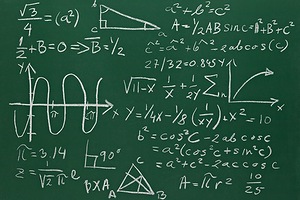Math can bring physical suffering
- Transfer

How much do you hate math problems? And the division in the column? Fraction? Math analysis?
For many people, the mere mention of such calculations causes horror and even, in some way, pain. A study by psychologists Ian Lyon and Sian Beilock showed that this is not an exaggeration: dislike for mathematics in some people is due to the fact that the feeling of having to work with numbers is comparable to physical pain. People having a high degree of mathematical anxiety (high levels of mathematics-anxiety - HMAs), it causes physical suffering.
The aforementioned scientists from the University of Chicago and Western, respectively, were interested in similar studies that proved thatsensations similar to physical pain in socially isolated people are proportional to the degree of fear and depression experienced by them . Mathematics, according to scientists, also causes a decent degree of anxiety in a person: “This is an ideal testing ground for studying how physically safe situations cause a neural response similar to real pain”.
Initially, the hypothesis was that it was the idea of the need to do mathematical calculations, and not the task as such, that was the trigger for fear of this procedure, which, in turn, causes painful sensations.
Scientists asked the participants in the experiment to answer a number of questions about how they feel before the upcoming math classes, dividing them into two groups of 14 people (with high (HMAs) and low (LMAs) degrees of mathematical anxiety, respectively). The criteria for determining its degree are based on the simple SMARS (Short Math Anxiety Rating-Scale) scale developed specifically for this purpose back in 1972 . It should be noted that the fact of the existence of the SMARS scale is not the first decade already speaks of how acute this problem is in the world of psychology.
So, to test the hypothesis, 28 participants in the experiment received a number of linguistic and mathematical puzzles, during the solution of which their brain underwent an MRI scan. Before each subsequent series of questions, the participants saw a light signal indicating the degree of complexity of the problem and its affiliation (language or mathematics).
Before the easier language and mathematical tasks, there was no difference in the neural response between the two groups (HMAs / LMAs), while in solving complex problems people who were less anxious about mathematics showed results much better than more anxious subjects. This is quite logical: in a state of stress, a person tends to be less effective in resolving situations requiring serious mental activity.
Studying the differences in brain activity in people with opposite poles of anxiety, Lyon drew attention to the fact that before solving complex mathematical problems, participants with a high level of anxiety increased activity in the islet lobe of the cerebral hemispheres and mid-cortex, after which it was much more difficult for them to solve the problem . At the same time, the less “mathematically disturbing” participants showed almost no neural response and easily coped with the task. It is important that these brain regions are responsible for pain. The results of the experiment showed that when participants with a high level of mathematical anxiety saw a light signal indicating that it was followed by a difficult mathematical task, the brain, figuratively, warned them that it would be painful now.
In conclusion, Lyon writes: “We received the first evidence pointing to the neural nature of mathematical anxiety. Previous similar studies focused mainly on social isolation and argued that it was an isolated state that made a person feel pain. However, the data from our experiment go much further and show that the very expectation of an upcoming unpleasant event entails a neural response that is responsible for pain. ”
It is believed that pain of this kind is an integral part of human nature, due to certain evolutionary processes. Lyon, however, considers it unlikely that "a purely evolutionary mechanism causes a brain neural response to the prospect of doing mathematics, which, in fact, is a fairly modern cultural phenomenon." Such a conclusion can shed light on other psychological phenomena, in particular, the nature of phobias.
Since the stress of expectation, as it turned out, affects performance and efficiency more than the task itself, it makes sense to explore alternative approaches to teaching mathematics at school. It might also be worthwhile to consider simpler tax reporting processes. Authorities often sound the alarm when they see statistics of mathematical illiteracy among the adult population, but perhaps people are not to blame for the fact that they could not concentrate on school mathematics lessons. Perhaps they were just scared by the numbers themselves.
